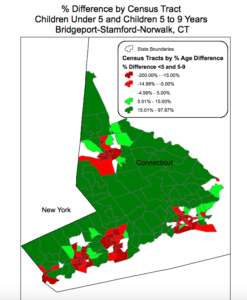**Update: Senate Democrats have confirmed the figure of 40,000 students was a mistake in the bill. Instead, the regionalization effort would apply to towns with less than 40,000 total population. The article below is amended to reflect that change**
Senate President Martin Looney, D-New Haven, proposed a bill which would force school districts in towns with less than 40,000 residents to consolidate with neighboring districts, alarming a number of towns and even fellow Democrats.
Senate Bill 454 would force the regionalization of a large number of towns in the state, merging their school districts with larger municipalities or cities. Only 24 municipalities in Connecticut have a population over 40,000. If passed, the change could cause an upheaval in where students are educated and at which schools.

The massive undertaking, according to the bill, would become effective starting in July of 2021.
The stated purpose of the bill is to create a more efficient school system, but fellow Democratic lawmakers and town officials don’t see it that way.
Under pressure, newly elected Wilton Senator Will Haskell issued a statement saying he could not support the bill.
The Wilton Republican Town Committee also issued a statement saying they strongly opposed a measure which would merge the Wilton school district with Norwalk. “The proposal (Senate Bill 454) of State Senate President Pro Tempore Martin Looney (D-New Haven) would seriously jeopardize Wilton’s reputation for high quality, locally controlled education. Other serious consequences for Wilton, known and unknown, would no doubt follow.”
Connecticut faces a declining school population in many areas, however the state’s current minimum budget requirement laws largely prevent municipalities from reducing education funding. Towns which meet particular guidelines can apply to the state to reduce their school budgets if student population declines.
But school funding is a hot topic, particularly after Gov. Dannel Malloy threatened to reduce or eliminate school funding for all but thirty municipalities during the 2017 budget standoff. Many towns’ state education funding was held flat or slightly reduced, necessitating changes and adjustments to municipal budgets.
State education funding for towns is the largest non-fixed cost to the state and also represents the biggest potential source of funds to deal with state budget deficits.
The push for regionalization of schools and towns has been a constant drumbeat in recent years as state lawmakers look for ways to lessen the impact of potential state cuts to municipal funding.
Although the proposal is merely a concept at this point, Democrats have control of both the House and Senate. The 2018 election saw Democrats like Will Haskell and Alexandra Bergstein elected to traditionally Republican strongholds in affluent areas of Fairfield County.
But the call to merge those school districts with surrounding cities could put Democrats like Haskell and Bergstein in opposition to top Democratic leadership, but Democrats have a strong enough majority in the Senate to pass the bill without Haskell or Bergstein’s vote.
Looney represents the city of New Haven, which would merge with surrounding suburbs like Branford, which has a population of about 28,000.
That plan might not prove very popular with parents in either the suburbs or the cities who have different sets of issues and challenges facing their districts.
President of Yankee Institute Carol Platt Liebau said the proposal by Looney is “misguided.”
“It destroys the local control of schools, which is what enables parents to have a voice in their children’s education,” Liebau said. “The chaos it will cause also threatens the quality of Connecticut’s schools — many of which are excellent. A town’s reputation and character is intimately tied to the quality of its schools. Anything that jeopardizes that quality is harmful not only to its children, but to the towns and ultimately Connecticut itself.”
School quality does appear to be a major factor in determining where Connecticut residents choose to live.

One study found Bridgeport — a poor performing school district — ranked highest in the nation for “family flight” as new parents moved out of the city to surrounding suburbs when their children reached school age.
Connecticut has one of the highest “education gaps” in the country between urban and suburban students. While the state generally has highly rated schools, its urban areas in cities like Bridgeport, New Haven and Hartford have concentrations of failing schools.
Looney’s bill would essentially force parents and children into a new school system. It remains unknown how districts would consolidate and whether new schools would need to be constructed in order to handle the merging of thousands of students.
The bill, which is referred to the Education Committee, will likely be closely tracked by town officials, lawmakers and interest groups. The Committee must first decide whether or not to take up the bill and whether to draft detailed language before conducting a public hearing.
Following a public hearing the Committee will vote whether or not to pass the bill out of Committee whereupon it could potentially be voted on in the Senate and House.
Looney also proposed a statewide property tax and motor vehicle tax earlier in the week, implementing a one mill state tax on households, while eliminating the municipal vehicle property tax and replacing it with a statewide vehicle property tax.
**For Legislative Updates on Public Hearings and Bill Tracking, Readers Can Visit the Yankee Institute Take Action page**


Donald Bysko
January 26, 2019 @ 12:27 pm
Leave the school systems as they are! You are going to mess up good schools that people support!
john schmidt
January 26, 2019 @ 2:38 pm
Looney is totally out of control. All it is a blatant money grab to get the towns to finance the bad democrat control of the cities. There is no regard for what is best to the students.
Laurie Alt
January 26, 2019 @ 5:05 pm
Now we know why Looney has that name! NO consolidation! I cannot imagine any person from any small town, Republican or Democrat, being in favor of such a ridiculous proposal. Towns work hard to take care of their schools, which contribute a great deal to their identity!
jrowinski
January 27, 2019 @ 10:47 am
Sen.Looney Tunes
Edward Murphy
January 27, 2019 @ 12:26 pm
I think it’s a great idea. Let’s face it we don’t have much of a choice,we put the Democrats in charge.
Jim DeGirolomo
January 27, 2019 @ 1:08 pm
His last name says it all he is Looney just what the state of Connecticut needs more taxes so more people well leave
Mark Conrad
January 27, 2019 @ 5:45 pm
This is a trickle down problem due to over regulation; from the federal department of education dictating policy to which States must ahere, through State regulation which towns must follow.
Why not remove the state’s current minimum budget requirement laws which prevent municipalities from reducing education funding.
Local communities should have the most influence on their schools and education programs.
richard ferrari
January 28, 2019 @ 9:21 am
As I see it another problem could be that the larger community would likely get budget and curriculum control of the regionalized district. With their larger budgets the regional school board membership would be weighted to favor the larger town/city.The smaller community’s fiscal contribution would not be under their control. It would be kind of like – we want this that or other programs and your taxpayers must help us pay for them.
Lynn
January 28, 2019 @ 6:33 pm
Not anywhere in anyplace is a proposal to cut spending and reel in these tax and spend politicians! Please wake up Connecticut, the sucking sound is that sound of Connecticut values, money, and population going down the drain……VERY SAD:(
Joseph Savino
January 29, 2019 @ 8:07 am
Ridgefield. Elections have consequences.
Sam
January 29, 2019 @ 12:21 pm
Plain and simple. If this passes and is enacted, I am moving out of CT and commuting to my job in the state (and look for a job outside of CT as well). That will be the end of me living here.
Erik
January 29, 2019 @ 11:21 pm
I would like to see some real discussion of regional school districts. I live in a rural district surrounded by other small and shrinking districts. All the undersized districts pay for our own superintendent, maintenance department, etc. and have to bid and purchase everything in smaller less cost efficient quantities. My taxes are high and my kids schools can’t offer as much as the larger districts. I would like to merge with the surrounding towns and create a regional school district, close underutilized buildings, eliminate some administration personnel. This would save tax money and better the schools. Instead of paying for 5 undersized high schools with limited resources create 2 or 3 well equipped schools. That’s not democratic or republican; It’s common sense.
Tony
January 31, 2019 @ 12:51 pm
Consolidation of schools makes good business sense. The teacher’s union would have a fit because we would need fewer teachers, administrators, etc. The school boards would push back because of losing total control. The parents would push back because of the long bus rides for elementary school children. The State should stop sending unfunded mandates to the schools. Stop giving grants to wealthy towns for all sorts of items. Solve the problem of low achieving schools by hiring better teachers. A school is only as good as its teachers.
Jackie
March 7, 2019 @ 3:39 am
Only as good as its teachers? Never mind parents who don’t take the time to parent. Or even more unfortunate, families who move from shelter to shelter, unstable lives. Children who come to school without having eaten since being at school the afternoon before. Having to worry about where their next meal is coming from or having to take care of their siblings cause mom and dad are at work all hours of the night (if they’re lucky and mom/dad aren’t on the streets.
Yup. Not one single other factor besides how “good” the teacher is. ????
Mary E. Nielsen
January 31, 2019 @ 2:04 pm
You will loose your tax base. Most people that choose to move to CT choose it because of its schools (at least in the suburbs). Simsbury High School is too big now, to regionalize it would make it incredibly large. I have seen children get lost in those schools before. They just fall through the cracks. How about we get rid of some Commissioners. That would save a lot today and in yrs to come. (Pension plans). People that can willleave this state in droves if they loose their good schools. Look at history to learn why I make a statement like that. Our kids are already getting not so great an education and they want to make it worse!?
Ryan
January 31, 2019 @ 2:07 pm
This is a horrible idea, the schools are perfect as they are. The control of the schools should remain with the town the school is in. This is an attempt to bully the smaller towns in Connecticut into submission. The small towns do not deserve this kind of treatment.
Ray
January 31, 2019 @ 7:22 pm
This is a state of the times strategic move on the states part, I hope the bill passes.it will entice smaller towns to fix the existing schools that they run and remove the burden and expense of newer schools for the taxpayers, it is also a great learning experience for the students, who will gain,Outside knowledge and a different perspective towards equality and education in the real world. I also see a long range savings for towns and state reguarding teachers salaries and pensions, it will conform the process of equality for everyone. Remember an education is a process of learning and how your child applys themselves.I think that most children would welcome this later in life as a learning experience.Im not so sure that the parents of the children could do the same.
Matthew
February 28, 2019 @ 5:42 pm
If you combine our performing school with nearby underperforming schools we’re moving to Westchester. Get someone else to pay high taxes for bad schools.
Kathy
March 2, 2019 @ 8:35 pm
I hardly think the unions are going to allow jobs to be lost so where exactly is the savings. Additionally, basing this on number of residents and and not the number of students could leave some districts with large student populations and others considerably smaller. I want to stay on Connecticut but they keep giving me reasons to leave